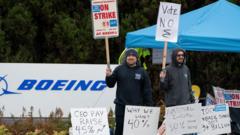Striking Boeing workers have overwhelmingly chosen to reject a recent wage increase proposal from the aerospace company, which offered a 35% raise over the next four years. The International Association of Machinists Aerospace Workers (IAM) reported that a decisive 64% of its members voted against this offer. This ongoing strike, initiated on September 13, has seen over 30,000 workers walk out in pursuit of better working conditions and compensation.
Kelly Ortberg, Boeing's CEO, highlighted the company’s current pivotal situation, stating losses have surged to around $6 billion. He emphasized the need for swift negotiations to address the workers' grievances after decades of sacrifices. The union's leaders reiterated that their strong rejection of the proposal signifies a push for better treatment and reflects workplace democracy, highlighting the challenges Boeing faces in maintaining morale and operations.
This marks the second such rejection of Boeing's proposals, following a previous offer that was turned down by an astounding 95% of the workers. As Ortberg, who took over the leadership role in August, strives to stabilize Boeing, he has acknowledged the company's struggle with debt and performance pitfalls. The strike has exacerbated production slowdowns and operational inefficiencies, putting additional pressure on the already beleaguered firm.
The crisis at Boeing was further intensified earlier this year following an incident involving a passenger plane, coupled with setbacks in their space division when a craft failed to proceed with a critical mission. These factors have led to significant operational losses, including $4 billion from the commercial aircraft segment and nearly $2.4 billion from the defense segment in the last quarter.
Despite these hurdles, Ortberg pointed out the firm still holds a backlog of approximately 5,400 airplane orders, suggesting potential for future recovery. However, he cautioned investors regarding the complexities and difficulties involved in resuming production post-strike. Highlighting a strategic approach, he mentioned a detailed return-to-work plan, emphasizing the importance of collaborative efforts to mitigate ongoing issues within the company’s culture.
To adapt to current realities, Boeing had announced an intention to reduce their workforce by about 10%. Thousands of employees face furlough due to the strike, impacting the broader supply chain. As the situation unfolds, the pressing need for negotiation and resolution looms large, echoing throughout the aviation industry and the general economy.




















